Charles E W Bean, Diaries, AWM38 3DRL 606/256/1 - 1915 - 1936 - Part 1
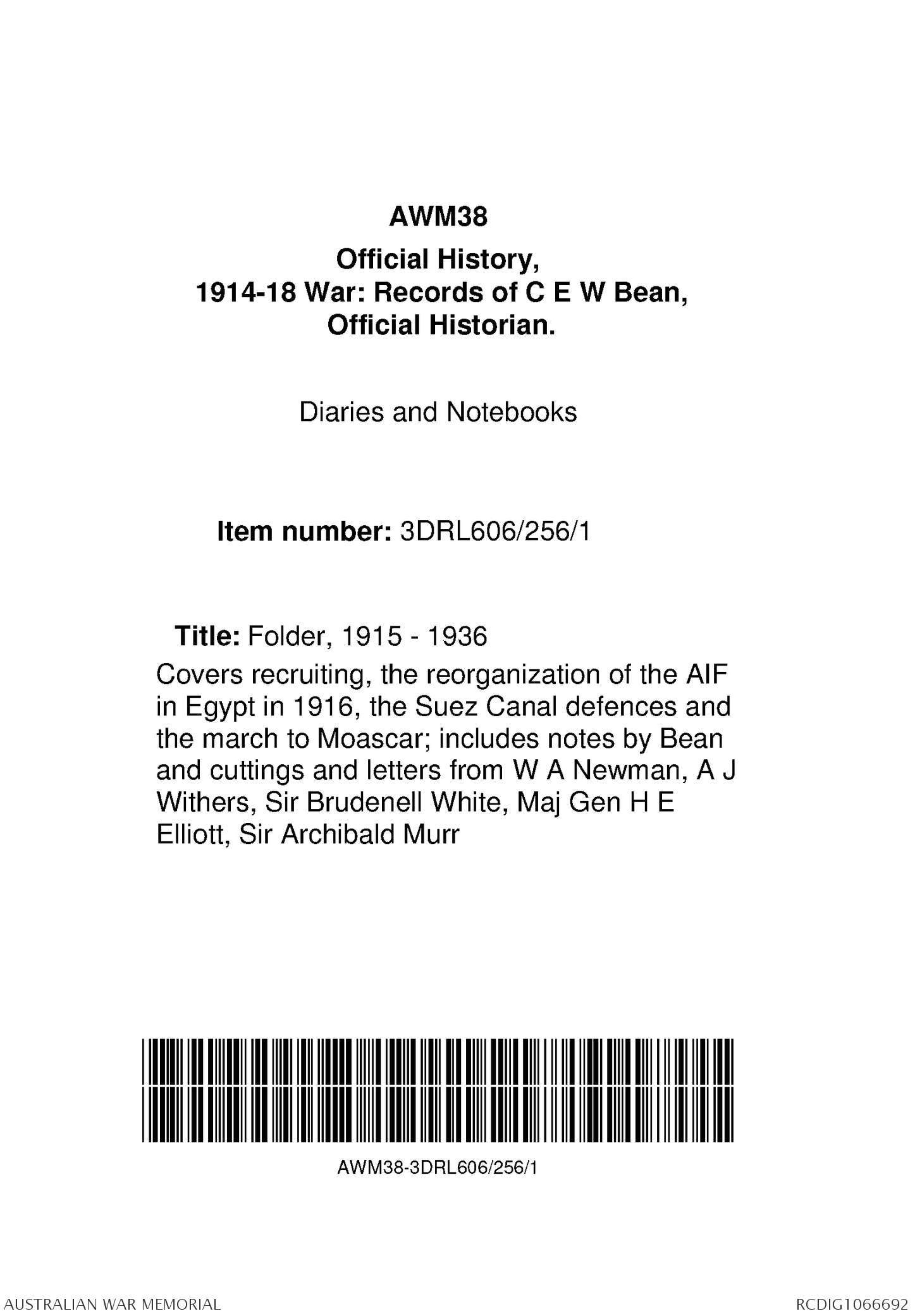

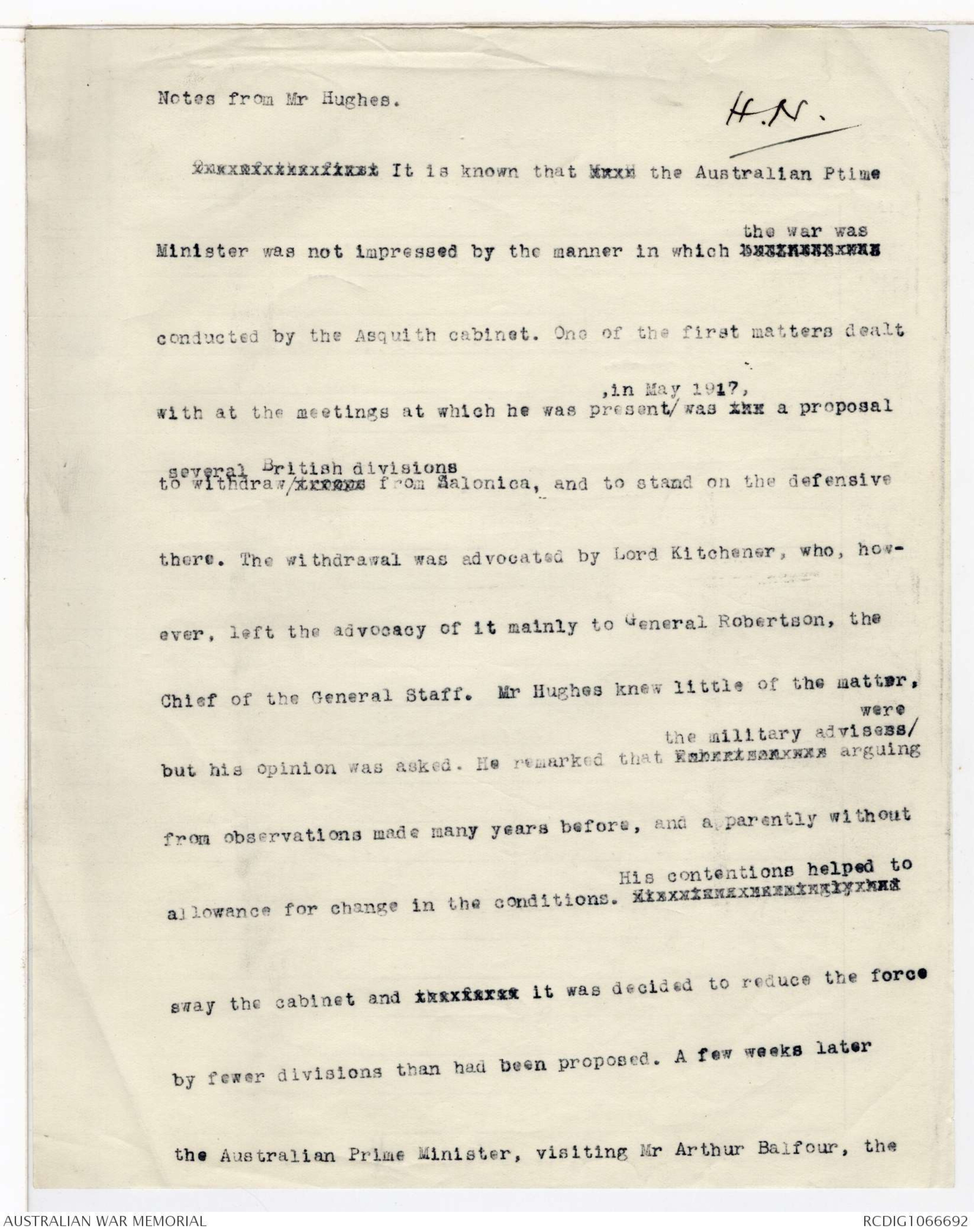
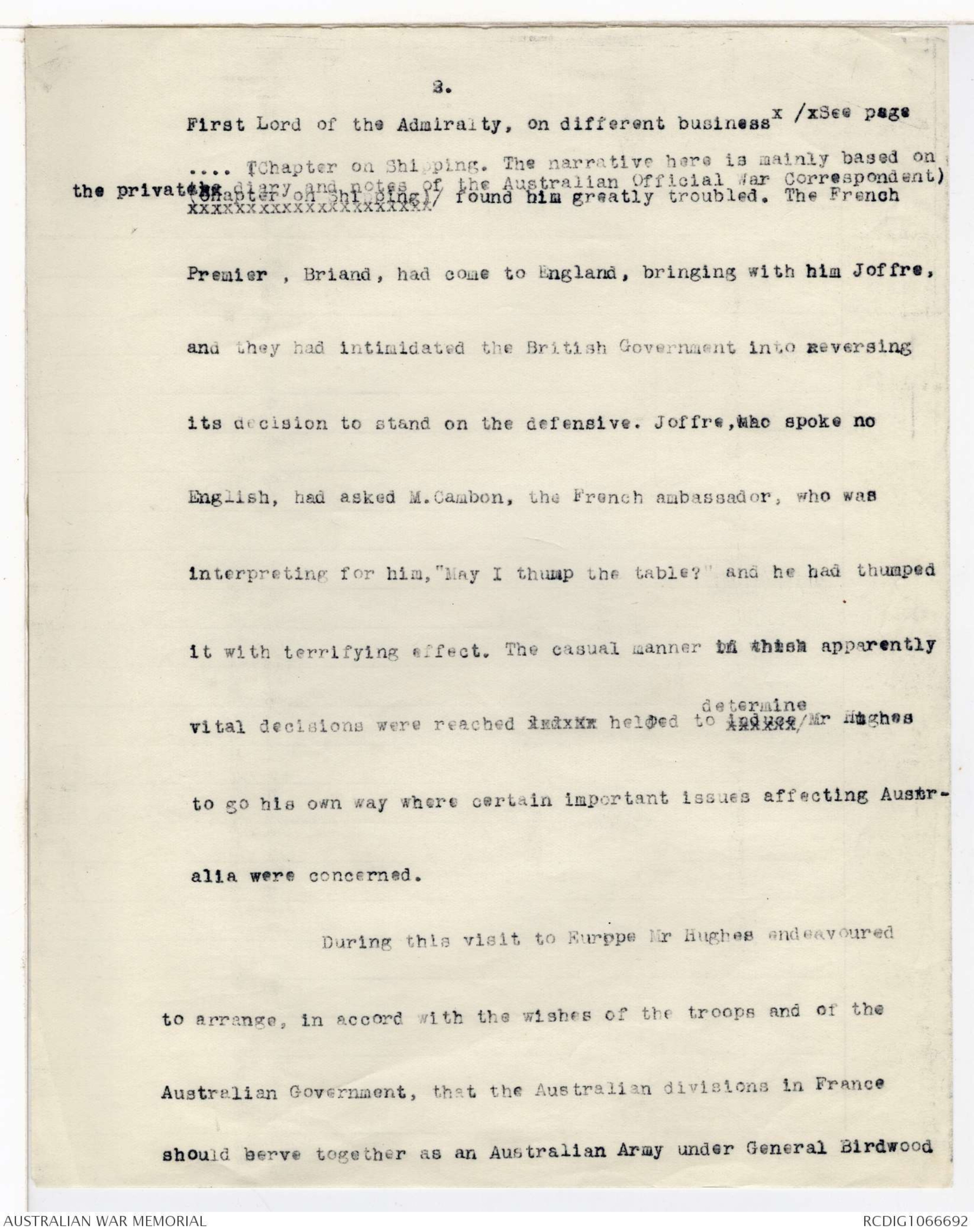
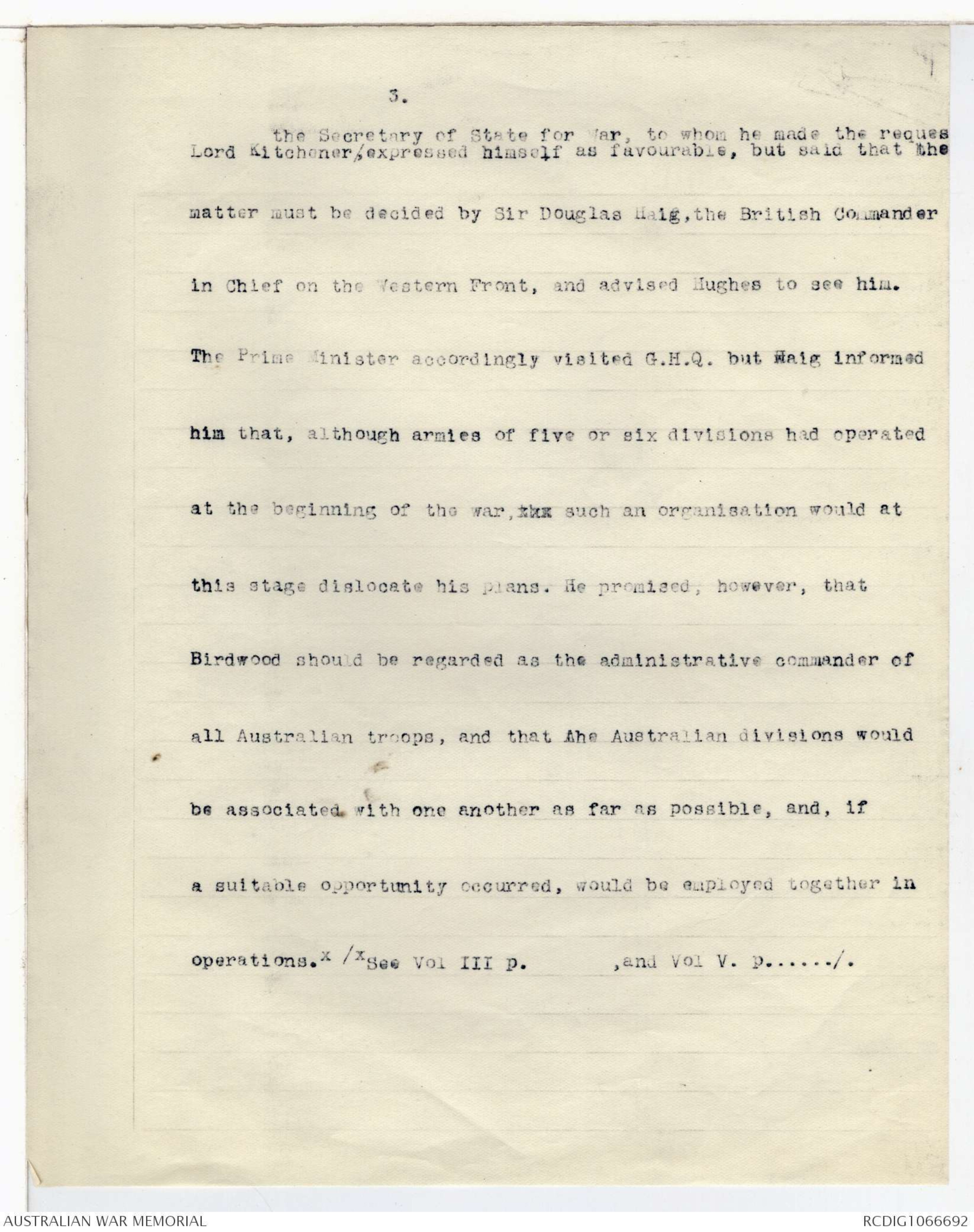
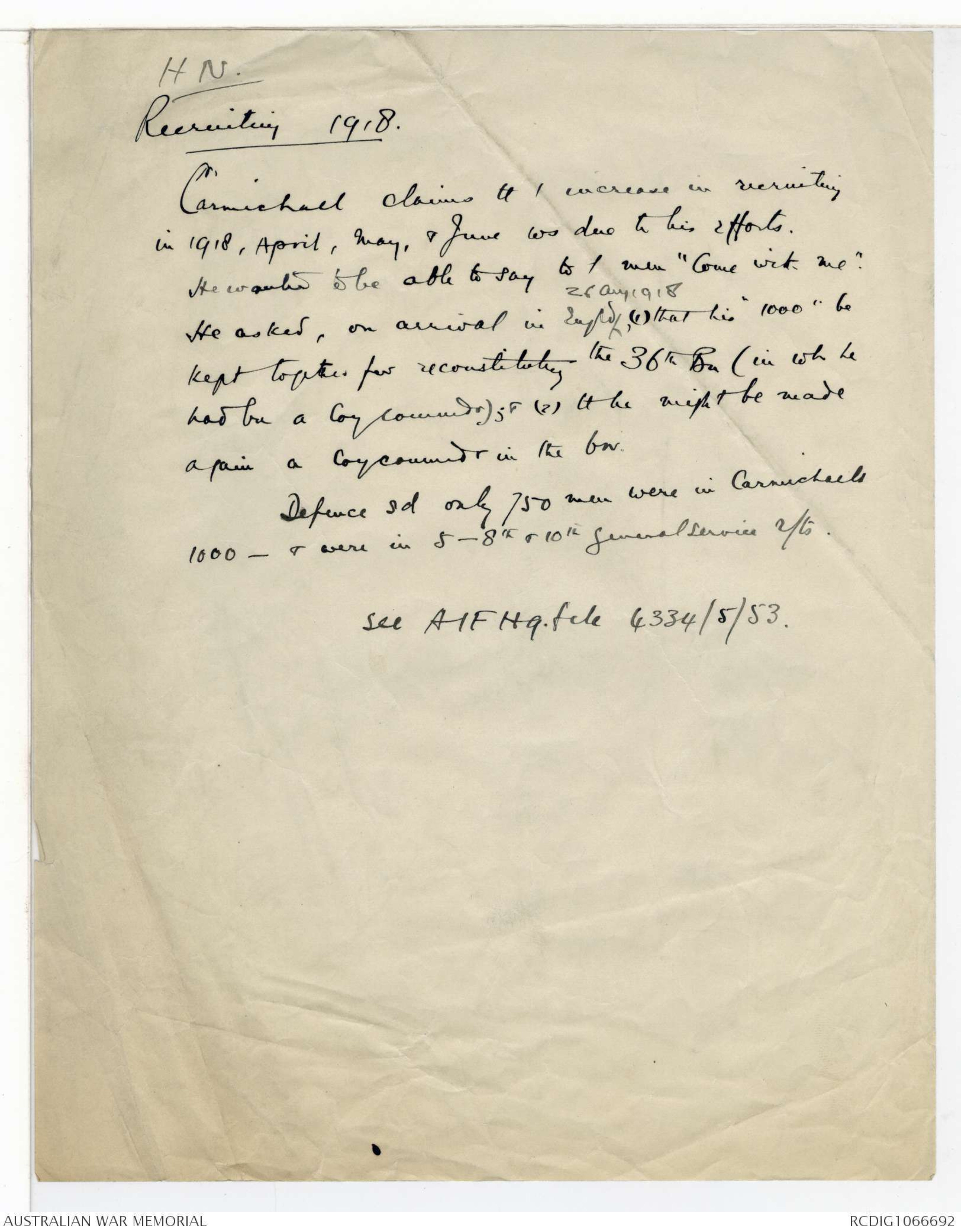
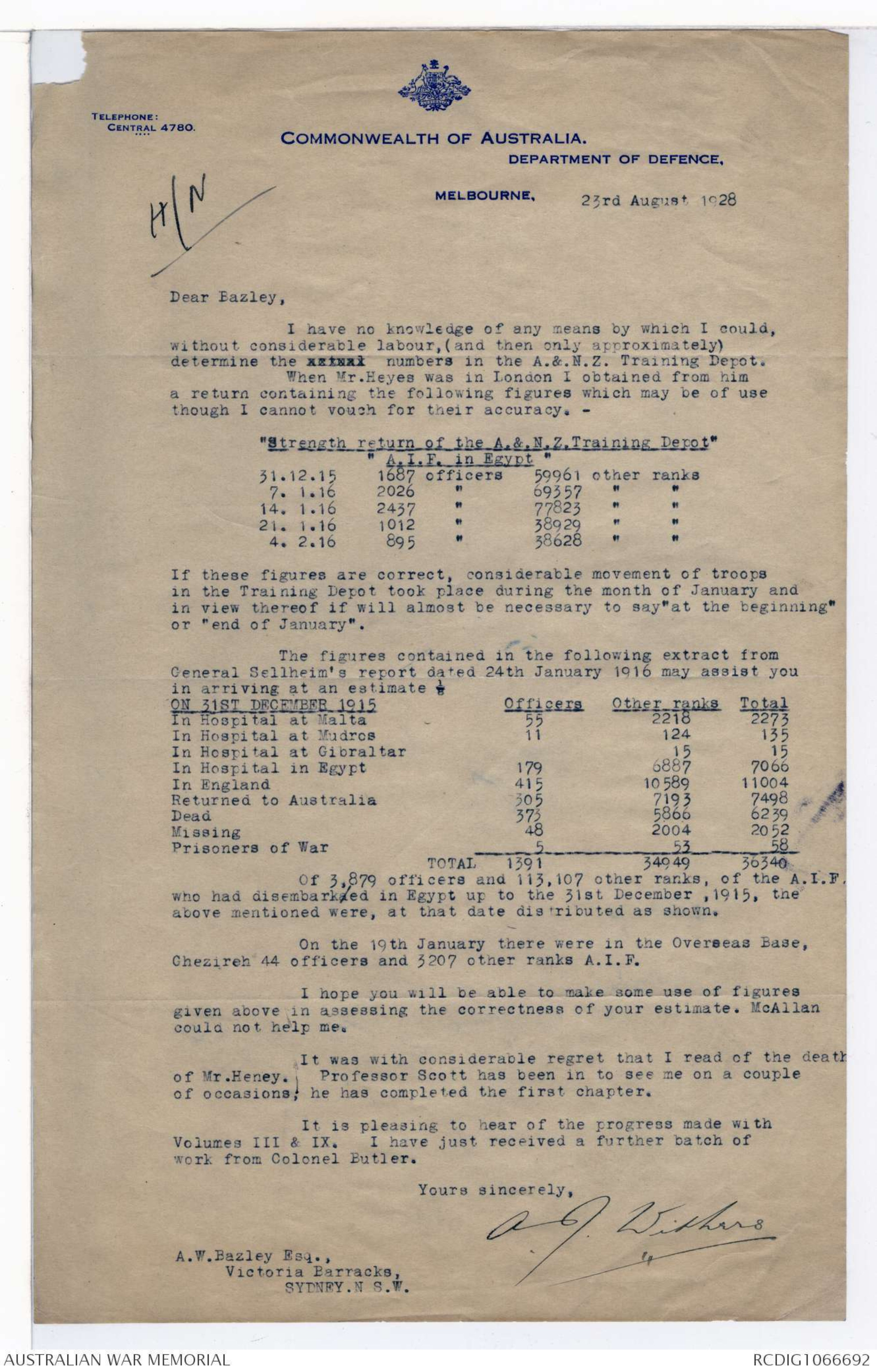
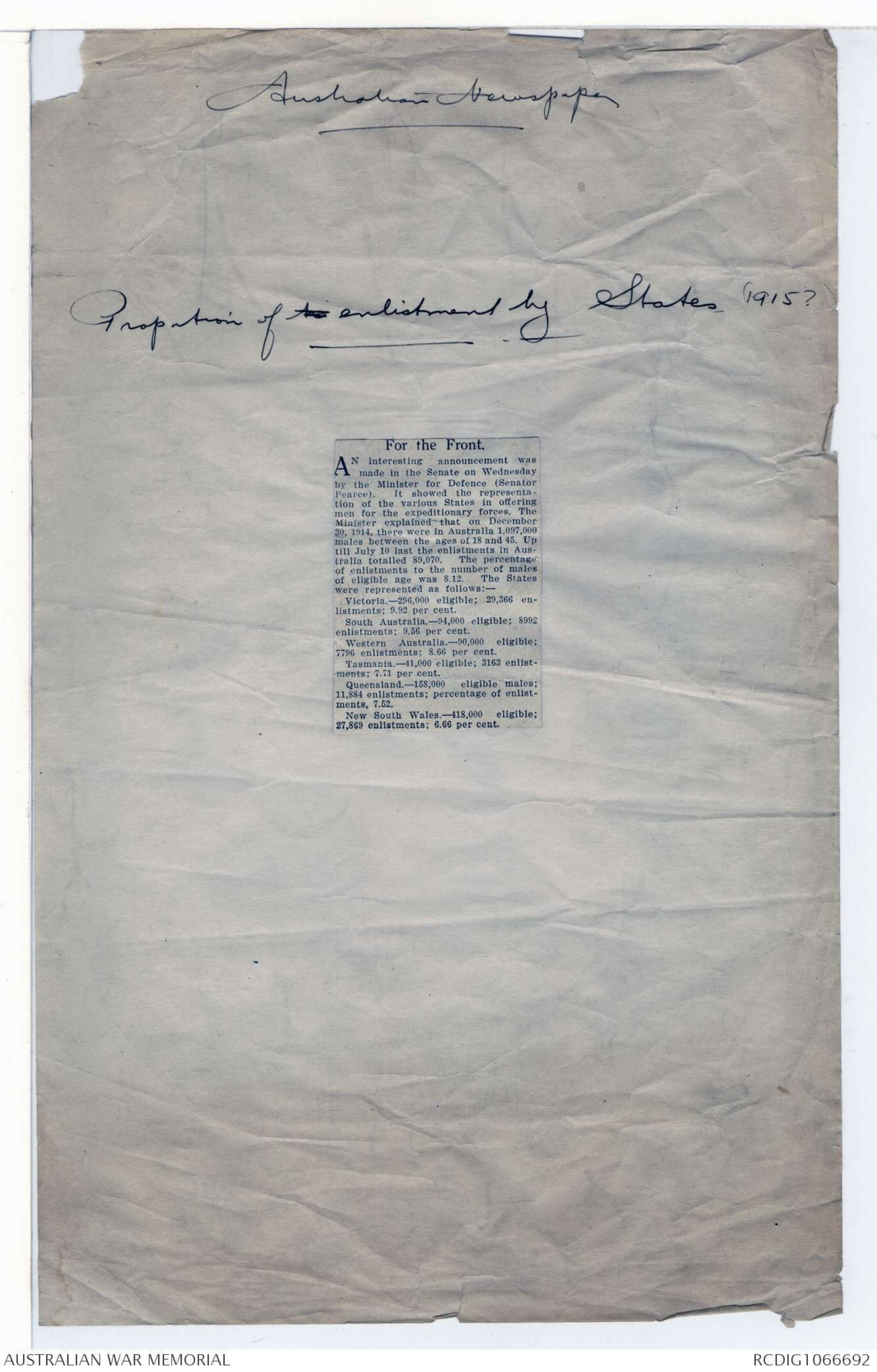
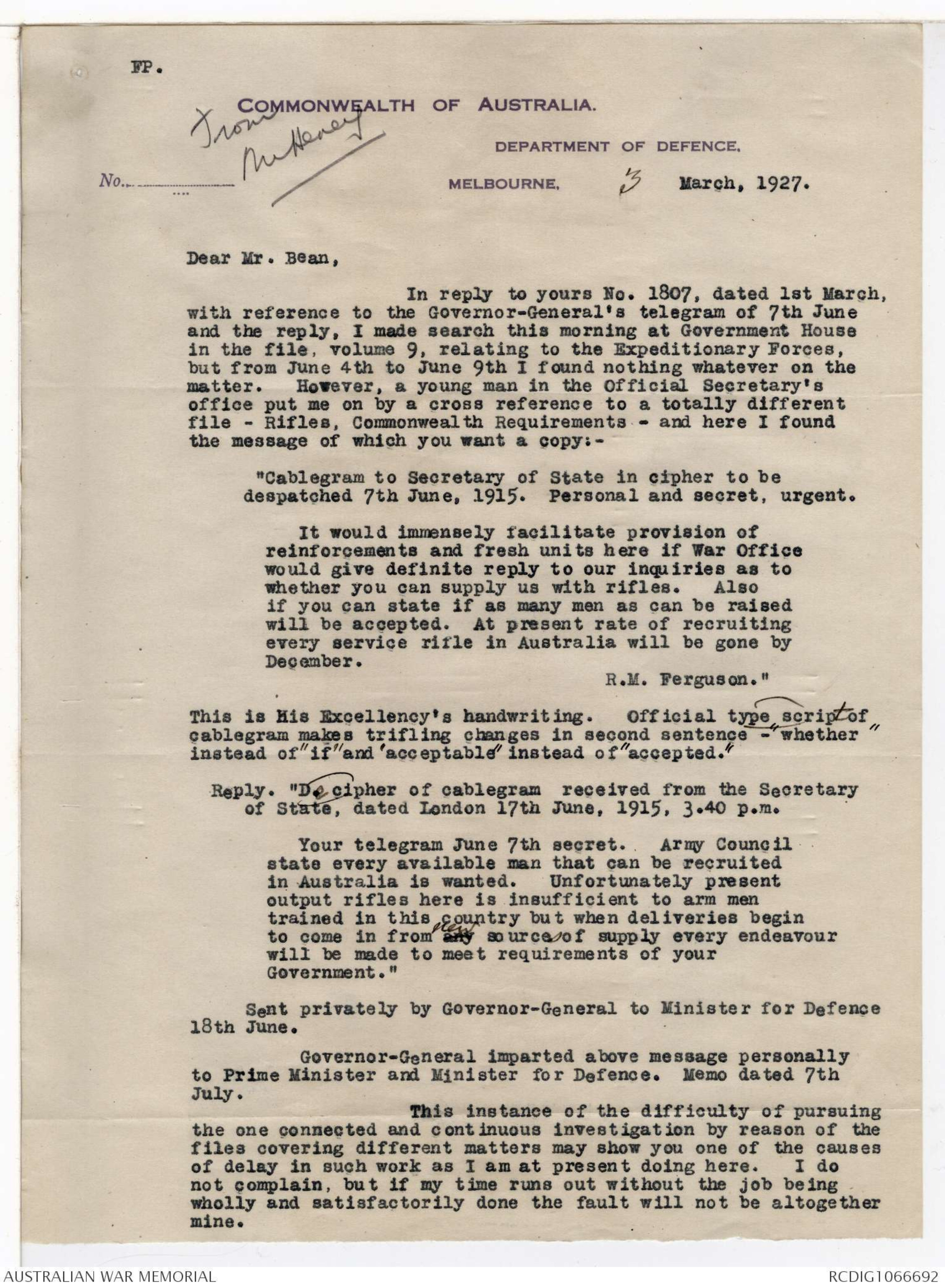
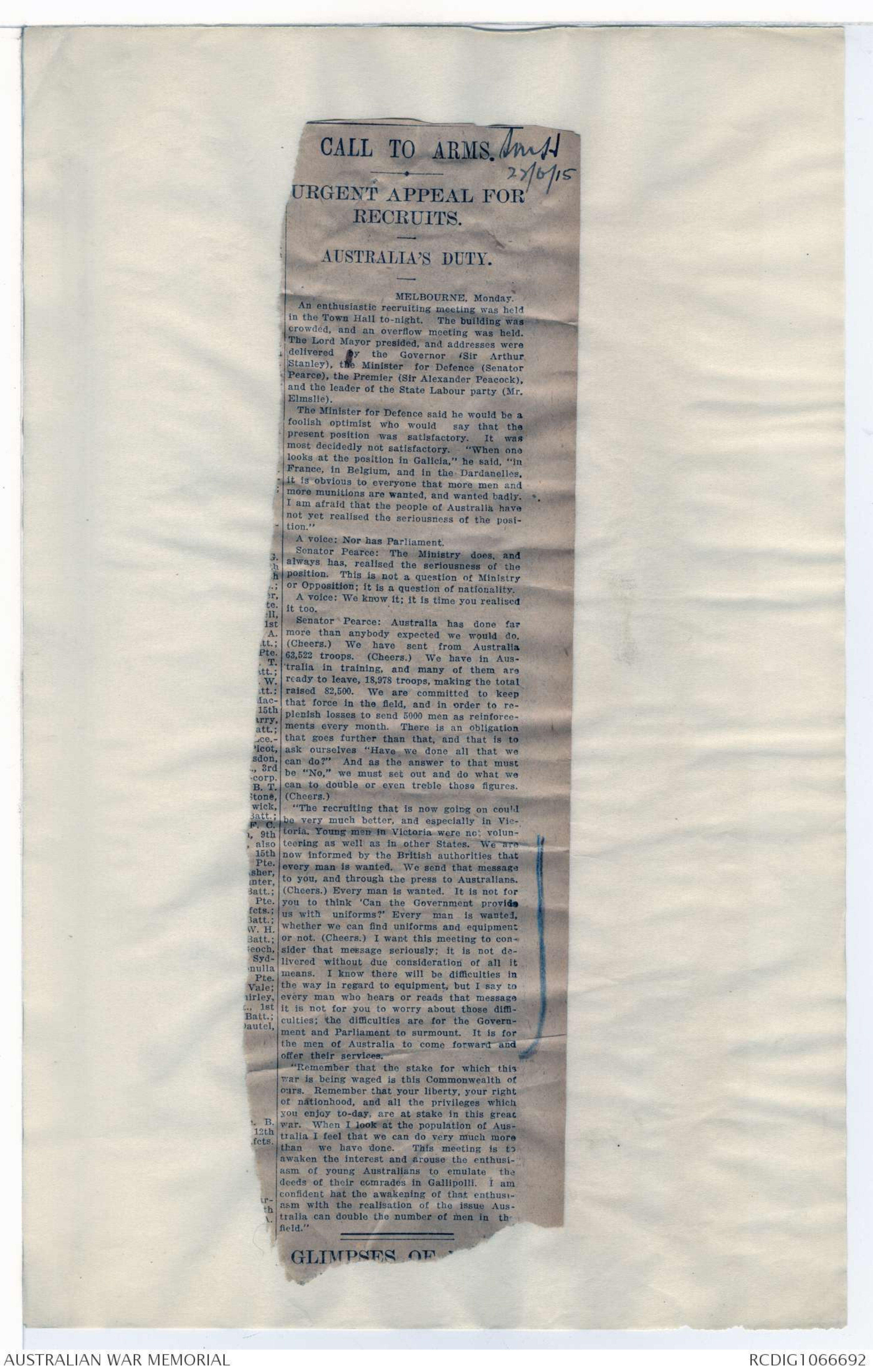
AWM38
Official History,
1914-18 War: Records of C E W Bean,
Official Historian.
Diaries and Notebooks
Item number: 3DRL606/256/1
Title: Folder, 1915 - 1936
Covers recruiting, the reorganization of the AIF
in Egypt in 1916, the Suez Canal defences and
the march to Moascar; includes notes by Bean
and cuttings and letters from W A Newman, A J
Withers, Sir Brudenell White, Maj Gen H E
Elliott, Sir Archibald Murr
AWM38-3DRL606/256/1
1st SET. No. 256.
AWM38 3DRL 606 ITEM 256 [1]
DIARIES AND NOTES OF C. E. W. BEAN
CONCERNING THE WAR OF 1914 - 1918
THE use of these diaries and notes is subject to conditions laid down in the terms
of gift to the Australian War Memorial. But, apart from those terms, I wish the
following circumstances and considerations to be brought to the notice of every
reader and writer who may use them.
These writings represent only what at the moment of making them I believed to be
true. The diaries were jotted down almost daily with the object of recording what
was then in the writer’s mind. Often he wrote them when very tired and half asleep;
also, not infrequently, what he believed to be true was not so —but it does not
follow that he always discovered this, or remembered to correct the mistakes when
discovered. Indeed, he could not always remember that he had written them.
These records should, therefore, be used with great caution, as relating only what
their author, at the time of writing, believed. Further, he cannot, of course, vouch
for the accuracy of statements made to him by others and here recorded. But he
did try to ensure such accuracy by consulting, as far as possible, those who had
seen or otherwise taken part in the events. The constant falsity of second-hand
evidence (on which a large proportion of war stories are founded) was impressed
upon him by the second, or third day of the Gallipoli campaign, notwithstanding that
those who passed on such stories usually themselves believed them to be true. All
second-hand evidence herein should be read with this in mind.
16 Sept., 1946. C.E.W. BEAN.
[*H.N.*]
Notes from Mr Hughes.One of the first It is known that xxxx the Australian Ptime
Minister was not impressed by the manner in which xxxxxxxxxx the war was
conducted by the Asquith cabinet. One of the first matters dealt
with at the meetings at which he was present ^, in May 1917, was the a proposal
to withdraw ^several British divisions troops from Salonica, and to stand on the defensive
there. The withdrawal was advocated by Lord Kitchener, who, however,
left the advocacy of it mainly to General Robertson, the
Chief of the General Staff. Mr Hughes knew little of the matter,
but his opinion was asked. He remarked that Robertson was the military advisers ^were arguing
from observations made many years before, and apparently without
allowance for change in the conditions. Hisxxxxxxxxxingly had His contentions helped to
sway the cabinet and therefore it was decided to reduce the force
by fewer divisions than had been proposed. A few weeks later
the Australian Prime Minister, visiting Mr Arthur Balfour, the
2.
First Lord of the Admiralty, on different business x/x See page
. . . . TChapter on Shipping. The narrative here is mainly based on
the privatexx diary and notes of the Australian Official War Correspondent)
(Chapter on Shipping) found him greatly troubled. The French
xxxxxxxxxxxxxxxxxxx
Premier, Briand, had come to England, bringing with him Joffre,
and they had intimidated the British Government into reversing
its decision to stand on the defensive. Joffre, who spoke no
English, had asked M. Cambon, the French ambassador, who was
interpreting for him, "May I thump the table?” and he had thumped
it with terrifying effect. The casual manner in which apparently
vital decisions were reached xxxxx helped to induce ^determine Mr Hughes
to go his own way where certain important issues affecting Australia
were concerned.
During this visit to Europe Mr Hughes endeavoured
to arrange, in accord with the wishes of the troops and of the
Australian Government, that the Australian divisions in France
should serve together as an Australian Army under General Birdwood
3
Lord Kitchener, ^the Secretary of State for War, to whom he made the reques
expressed himself as favourable, but said that the
matter must be decided by Sir Douglas Haig, the British Commander
in Chief on the Western Front, and advised Hughes to see him.
The Prime Minister accordingly visited G.H.Q. but Haig informed
him that, although armies of five or six divisions had operated
at the beginning of the war, the such an organisation would at
this stage dislocate his plans. He promised, however, that
Birdwood should be regarded as the administrative commander of
all Australian troops, and that the Australian divisions would
be associated with one another as far as possible, and, if
a suitable opportunity occurred, would be employed together in
operations. x/x see Vol III p. ,and Vol V. p . . . . . ./.
[*H N.*]
Recruiting 1918.
Carmichael claims tt / increase in recruiting
in 1918, April, May, & June ws due to his efforts.
He wanted to be able to say to / men "Come with me".
He asked, on arrival in Engld ^26 Aug 1918, (1) that his "1000" be
kept together for reconstituting the 36th Bn (in wh he
had bn a Coy commdr); & (2) tt he might be made
again a Coy commdr in the bn.
Defence sd only 750 men were in Carmichaels
1000 - & were in 5-8th & 10th generals services rfts.
See AIF Hq. file 4334/5/53.
[*H/N*]
TELEPHONE:
CENTRAL 4780
COMMONWEALTH OF AUSTRALIA.
DEPARTMENT OF DEFENCE,
MELBOURNE,
23rd August 1928
Dear Bazley,
I have no knowledge of any means by which I could,
without considerable labour, (and then only approximately)
determine the actual numbers in the A.&.N.Z. Training Depot.
When Mr. Heyes was in London I obtained from him
a return containing the following figures which may be of use
though I cannot vouch for their accuracy. -
| "Strength return of the A.&.N.Z. Training Depot" | |||||
|
"A.I.F. in Egypt" |
|||||
|
31.12.15 |
1687 |
officers |
59961 |
other | ranks |
|
7.1.16 |
2026 |
" |
69357 |
" |
" |
|
14.1.16 |
2437 |
" |
77823 |
" |
" |
|
21.1.16 |
1012 |
" |
38929 |
" |
" |
|
4.2.16 |
895 |
" |
38628 |
" |
" |
If these figures are correct, considerable movement of troops
in the Training Depot took place during the month of January and
in view thereof if will almost be necessary to say "at the beginning"
or "end of January".
The figures contained in the following extract from
General Sellheim's report dated 24th January 1916 may assist you
in arriving at an estimate 1/8
| ON 31ST DECEMBER 1915 | Officers | Other ranks | Total |
| In Hospital at Malta |
55 |
2218 |
2273 |
| In Hospital at Mudros |
11 |
124 |
135 |
| In Hospital at Gibraltar |
|
15 |
15 |
| In Hospital in Egypt |
179 |
6887 |
7066 |
| In England |
415 |
10589 |
11004 |
| Returned to Australia |
305 |
7193 |
7498 |
| Dead |
373 |
5866 |
6239 |
| Missing |
48 |
2004 |
2052 |
| Prisoners of War |
5 |
53 |
58 |
|
TOTAL |
1391 |
34949 |
36340 |
Of 3,879 officers and 113,107 other ranks, of the A.I.F.
who had disembarkaed in Egypt up to the 31st December, 1915, the
above mentioned were, at that date distributed as shown.
On the 19th January there were in the Overseas Base,
Ghezireh 44 officers and 3207 other ranks A. I. F.
I hope you will be able to make some use of figures
given above in assessing the correctness of your estimate. McAllan
could not help me.
It was with considerable regret that I read of the death
of Mr. Heney. Professor Scott has been in to see me on a couple
of occasions; he has completed the first chapter.
It is pleasing to hear of the progress made with
Volumes III & IX. I have just received a further batch of
work from Colonel Butler.
Yours sincerely,
A.J. Withers
A.W.Bazley Esq.,
Victoria Barracks,
SYDNEY. NS.W.
Australian Newspaper
Proportion of th enlistment by States 1915?
For the Front.
AN Interesting announcement was
made in the Senate on Wednesday
by the Minister for Defence (Senator
Pearce). It showed the representation
of the various States in offering
men for the expeditionary forces. The
Minister explained that on December
30, 1914, there were in Australia 1,097,000
males between the ages of 18 and 45. Up
till July 10 last the enlistments in Australia
totalled 89,070. The percentage
of enlistments to the number of males
of eligible age was 8.12. The States
were represented as follows:-
Victoria.- 296,000 eligible: 29,366 enlistments;
9.92 per cent.
South Australia.- 94,000 eligible: 8992
enlistments; 9.56 per cent.
Western Australia.- 90,000 eligible;
7796 enlistments; 8.66 per cent.
Tasmania.- 41,000 eligible; 3163 enlistments;
7.71 per cent.
Queensland.- 158,000 eligible males;
11,884 enlistments; percentage of enlistments,
7.52
New South Wales.- 418,000 eligible;
21,869 enlistments: 6.66 per cent.
[*From
Mr Heney*]
FP.
COMMONWEALTH OF AUSTRALIA.
DEPARTMENT OF DEFENCE.
No. .........
MELBOURNE 3 March, 1927.
Dear Mr. Bean,
In reply to yours No. 1807, dated 1st March,
with reference to the Governor-General's telegram of 7th June
and the reply, I made search this morning at Government House
in the file, volume 9, relating to the Expeditionary Forces,
but from June 4th to June 9th I found nothing whatever on the
matter. However, a young man in the Official Secretary's
office put me on by a cross reference to a totally different
file - Rifles, Commonwealth Requirements - and here I found
the message of which you want a copy:-
"Cablegram to Secretary of State in cipher to be
despatched 7th June, 1915. Personal and secret, urgent.
It would immensely facilitate provision of
reinforcements and fresh units here if War Office
would give definite reply to our inquiries as to
whether you can supply us with rifles. Also
if you can state if as many men as can be raised
will be accepted. At present rate of recruiting
every service rifle in Australia will be gone by
December.
R.M. Ferguson."
This is His Excellency's handwriting. Official type script of
cablegram makes trifling changes in second sentence - "whether"
instead of "if" and "acceptable" instead of "accepted."
Reply. "Decipher of cablegram received from the Secretary
of State, dated London 17th June, 1915, 3.40 p.m.
Your telegram June 7th secret. Army Council
state every available man that can be recruited
in Australia is wanted. Unfortunately present
output rifles here is insufficient to arm men
trained in this country but when deliveries begin
to come in from any new sources of supply every endeavour
will be made to meet requirements of your
Government."
Sent privately by Governor-General to Minister for Defence
18th June.
Governor-General imparted above message personally
to Prime Minister and Minister for Defence. Memo dated 7th
July.
This instance of the difficulty of pursuing
the one connected and continuous investigation by reason of the
files covering different matters may show you one of the causes
of delay in such work as I am at present doing here. I do
not complain, but if my time runs out without the job being
wholly and satisfactorily done the fault will not be altogether
mine.
[*SMH
22/6/15*]
CALL TO ARMS
URGENT APPEAL FOR
RECRUITS.
AUSTRALIA'S DUTY.
MELBOURNE, Monday.
An enthusiastic recruiting meeting was held
in the Town Hall to-night. The building was
crowded, and an overflow meeting was held.
The Lord Mayor presided, and addresses were
delivered the Governor (Sir Arthur
Stanley), the Minister for Defence (Senator
Pearce), the Premier (Sir Alexander Peacock),
and the leader of the State Labour party (Mr.
Elmslie).
The Minister for Defence said he would be a
foolish optimist who would say that the
present position was satisfactory. It was
most decidedly not satisfactory. "When one
looks at the position in Galicia," he said. "In
France, in Belgium, and in the Dardanelles,
it is obvious to everyone that more men and
more munitions are wanted, and wanted badly.
I am afraid that the people of Australia have
not yet realised the seriousness of the position."
A voice: Nor has Parliament.
Senator Pearce: The Ministry does, and
always has, realised the seriousness of the
position. This is not a question of Ministry
or Opposition; it is a question of nationality.
A voice: We know it; it is time you realised
it too.
Senator Pearce: Australia has done far
more than anybody expected we would do.
(Cheers.) We have sent from Australia
63,522 troops. (Cheers.) We have in Australia
in training, and many of them are
ready to leave, 18,978 troops, making the total
raised 82,500. We are committed to keep
that force in the field, and in order to replenish
losses to send 5000 men as reinforcements
every month. There is an obligation
that goes further that, and that is to
ask ourselves "Have we done all that we
can do?" And as the answer to that must
be "No," we must set out and do what we
can to double or even treble those figures.
(Cheers.)
The recruiting that is now going on could
be very much better, and especially in Victoria.
Young men in Victoria were not volunteering
as well as in other States. We are
now informed by the British authorities that
every man is wanted. We send that message
to you, and through the press to Australians.
(Cheers.) Every man is wanted. It is not for
you to think 'Can the Government provide
us with the uniforms?' Every man is wanted,
whether we can find uniforms and equipment:
or not. (Cheers.) I want this meeting to consider
that message seriously; it is not delivered
without due consideration of all it
means. I know there will be difficulties in
the way in regard to equipment, but I say to
every man who hears or reads that message
it is not for you to worry about those difficulties;
the difficulties are for the Government
and Parliament to surmount. It is for
men of Australia to come forward and
offer their services.
"Remember that the stake for which this
war is being waged is this Commonwealth of
ours. Remember that your liberty, your right
of nationhood, and all the privileges which
you enjoy to-day, are at stake in this great
war. When I look at the population of Australia
I feel that we can do very much more
than we have done. This meeting is to
awaken the interest and arouse the enthusiasm
of young Australians to emulate the
deeds of their comrades in Gallipoli. I am
confident hat the awakening of that enthusiasm
with the realisation of the issue Australia
can double the number of men In the
field."
 Deb Parkinson
Deb ParkinsonThis transcription item is now locked to you for editing. To release the lock either Save your changes or Cancel.
This lock will be automatically released after 60 minutes of inactivity.